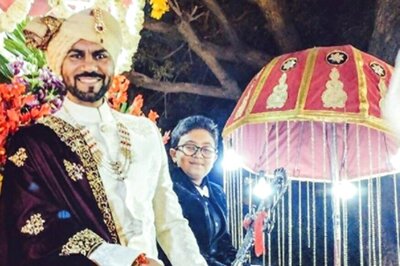
views
New Delhi: A top government functionary has dismissed criticism of the central government’s decision to allow a delegation of lawmakers from the European Union (EU) to visit Jammu and Kashmir, saying the move was necessary to counter Pakistan’s influence in Europe.
“The reason why the EU panel was allowed was because Pakistan support groups are very active in Europe and were creating an anti-India mood,” the government functionary told CNN-News18, adding that a number of EU MPs of Pakistani origin were involved. “The way in which Pakistan has been going on and on, some measures were required to counter them.”
A 23-member delegation of EU parliamentarians reached Kashmir on Tuesday for a first-hand assessment of the situation after the state's special status was revoked in August. They were are the first high-level foreign visitors to Kashmir after the August 5 decision of the Centre to revoke Jammu and Kashmir's special status under Article 370 and divide the state into the Union Territories of Jammu and Kashmir, and Ladakh. Several of those lawmakers belong to right and far-right parties and are not part of he mainstream in their own countries.
The functionary said that the government is not perturbed by the opposition's criticism that it had stopped elected Indian MPs from visiting the Valley but had rolled out the red carpet for the EU delegation.
“What opposition wanted to do by going to Kashmir was politics. Whatever they are saying is in any case being used by Pakistan to criticise India. We cannot allow them to practise politics on this issue,” added the functionary.
Among politicians denied access to Kashmir are the Communist Party of India's D Raja, who attempted to visit Srinagar twice but was sent back both times, as well as the Congress's Rahul Gandhi and Ghulam Nabi Azad.
A few members of the EU delegation had also criticised the government on this count.
MP Nicolaus Fest, a part of the delegation, had said the government should allow opposition leaders to visit the Valley.
“I think if you let in European Union parliamentarians, you should also let in opposition politicians from India. So, there is some kind of disbalance, the government should somehow address it,” he told reporters after visiting Srinagar.
Spanish MP Hermann Tertsch also said that the delegates were "kept away” from meeting many people. “We are conscious of the fact that we are being kept away from some people,” he had said after a tour of the Dal Lake.
Government sources said Home Minister Amit Shah was in the loop about the visit of the delegation that was largely coordinated by the National Security Advisor’s office.
Sources said the government is happy with the outcome of the visit. “The fact that the EU panel spoke about Article 370 being an internal issue is good,” the functionary said.
French MP Henri Malosse on Wednesday said, “If we talk about Article 370, it is India’s internal matter. What concerns us is terrorism, which is a global menace, and we should stand with India in fighting it. There was an unfortunate incident of the killing of five innocent labourers by terrorists. We condemn it.”
Five labourers from West Bengal's Murshidabad district were shot dead and another was injured by terrorists in Kulgam district of South Kashmir on Tuesday.
Several Opposition parties as well as allies of the BJP had criticised the visit, with the Congress describing it as a "national embarrassment" and as "an ill-advised PR exercise".
People in Kashmir also described the delegation’s visit as a “managed show” and said that no genuine person was allowed to meet the EU MPs.
Hitting back at the opposition, the BJP had said that nobody has stopped leaders of the Congress and other parties from travelling to the Valley as the situation there has "normalised".


















Comments
0 comment